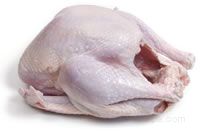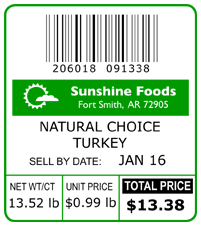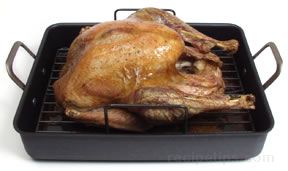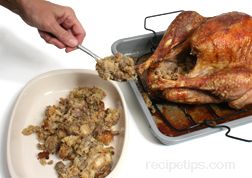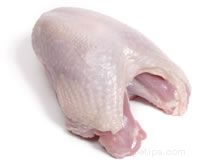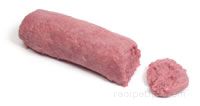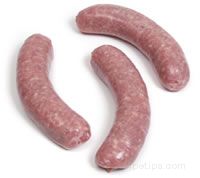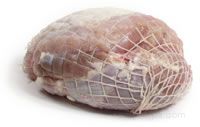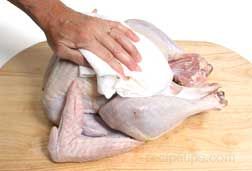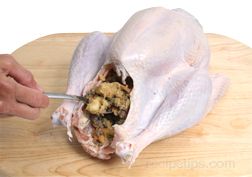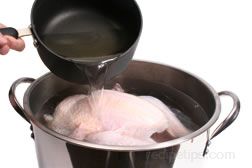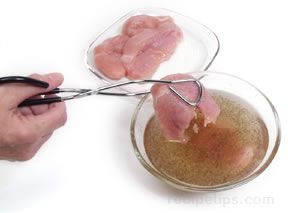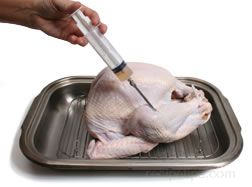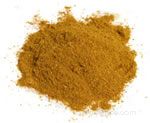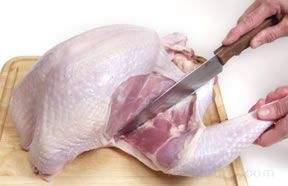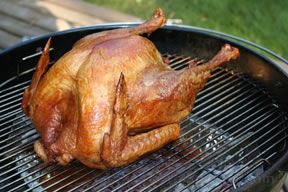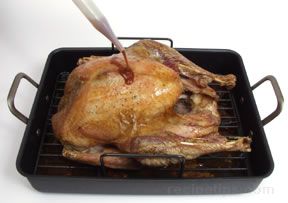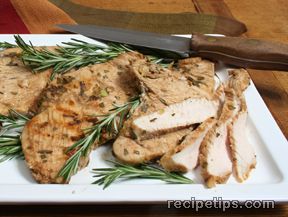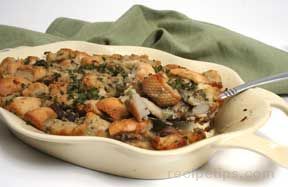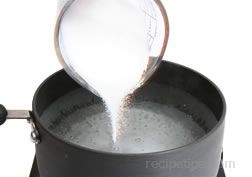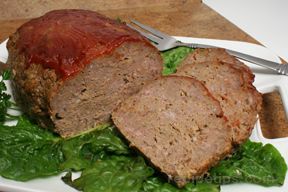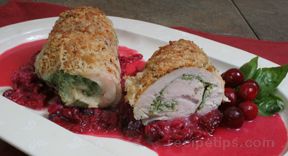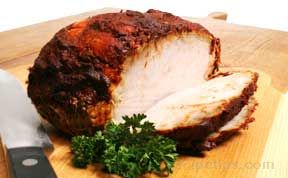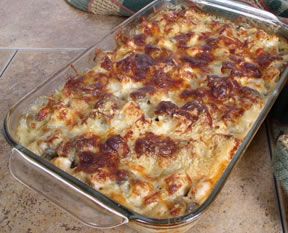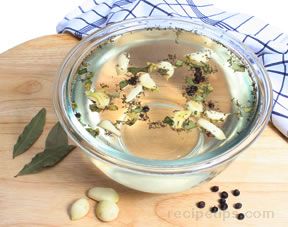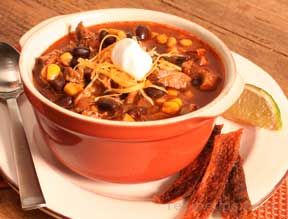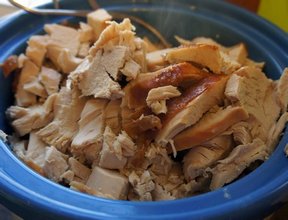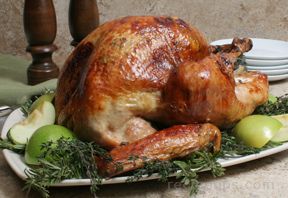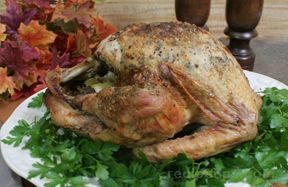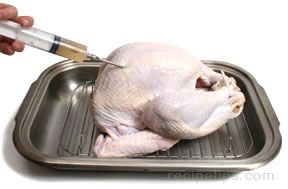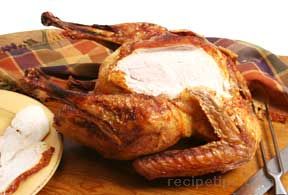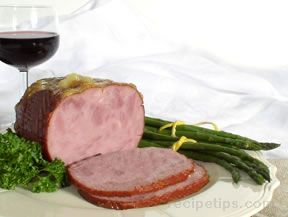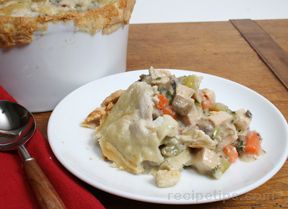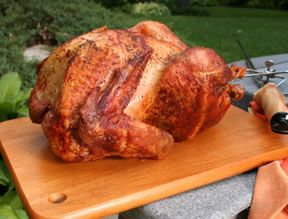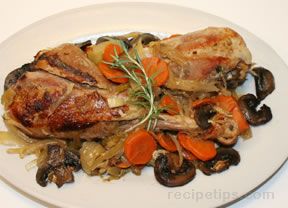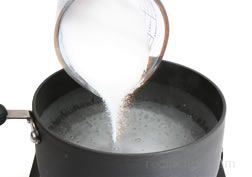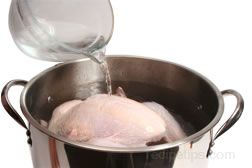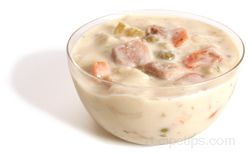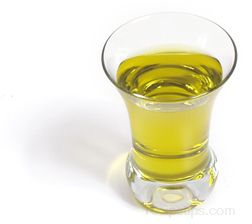Turkey Meat Nutritional Value | Turkey Products Nutritional Value
Turkey Cooking Nutritional Tips
|
The USDA recommends 2 or 3 servings of meat, fish, or poultry per day. A serving of any type of cooked meat is equal to 3 ounces and is about the size of a deck of cards. Concerns over saturated fat and cholesterol have caused many people to reduce or eliminate their consumption of many types of red meat and to choose a healthier alternative such as turkey. Compared to other meats, turkey has fewer calories, less fat, less cholesterol, and very little sodium, but it is high in protein, vitamins, and minerals. Most of the fat in turkey is within the skin and most of the fat within the meat is in the dark meat. The white meat with the skin removed is a good food source for people on low-fat and/or low sodium diets. The meat fiber is easier to digest than other types of meat, which makes it a good choice for individuals that may have digestive problems. Turkey is an excellent source of several important vitamins and nutrients such as iron, niacin, zinc, potassium, and B vitamins. |
| Nutritional Value Comparison of Turkey Meat to Other Meats (Based on a 3 ounce Serving Size) |
Type of Meat |
Calories |
Fat (grams) |
Saturated Fat (grams) |
Protein (grams) |
Cholesterol (milligrams) |
Turkey Breast skinless,roasted |
115 | 0.6 | 0.2 | 26 | 67 |
Turkey Breast skin on, roasted |
161 | 6.3 | 1.8 | 24 | 67 |
Turkey Dark Meat skinless, roasted |
159 | 6.1 | 2.1 | 24 | 72 |
Turkey Leg skin on, roasted |
177 | 8.3 | 2.6 | 24 | 72 |
Chicken Breast skin on, roasted |
170 | 7.0 | 2.0 | 25 | 70 |
Chicken Breast skinless, roasted |
120 | 1.5 | 0.5 | 24 | 70 |
Duck skinless, roasted |
171 | 9.5 | 3.5 | 20 | 76 |
Lamb Shank fat trimmed, roast |
153 | 5.7 | 2.0 | 24 | 74 |
Beef Tenderloin fat trimmed, roast |
180 | 8.5 | 3.2 | 24 | 70 |
Beef Chuck Blade fat trimmed, braise |
210 | 11.0 | 4.0 | 26 | 90 |
Pork Tenderloin fat trimmed, roast |
139 | 4.1 | 1.4 | 26 | 67 |
Pork Blade Roast fat trimmed, roast |
191 | 9.2 | 3.3 | 25 | 75 |
Turkey Products Nutritional Value
| Nutritional Value of Various Turkey Products (Based on a 3 ounce Serving Size) |
Type of Product |
Calories |
Fat (grams) |
Saturated Fat (grams) |
Protein (grams) |
Cholesterol (milligrams) |
Turkey Loaf Luncheon Meat breast meat |
94 | 1.4 | 0.4 | 19 | 35 |
Turkey Ham |
109 | 4.3 | 1.5 | 16 | 48 |
Cooked Turkey Roast light and dark |
132 | 5.0 | 1.6 | 18 | 45 |
Ground Turkey cooked |
200 | 11.2 | 2.9 | 23 | 87 |
Turkey Pastrami |
120 | 5.3 | 1.5 | 16 | 46 |
Canned Turkey Meat with broth |
139 | 5.9 | 1.7 | 20 | 56 |
Turkey Hot Dog |
192 | 15 | 5.0 | 12 | 91 |
Turkey Bratwurst lean |
131 | 7.7 | 1.9 | 13 | 42 |
Turkey Cooking Nutritional Tips
|
Turkey can be even more nutritious if it is prepared using a low fat cooking method. Try one of the following healthy cooking methods if your goal is to enjoy turkey cooked with little or no added fat:
|






